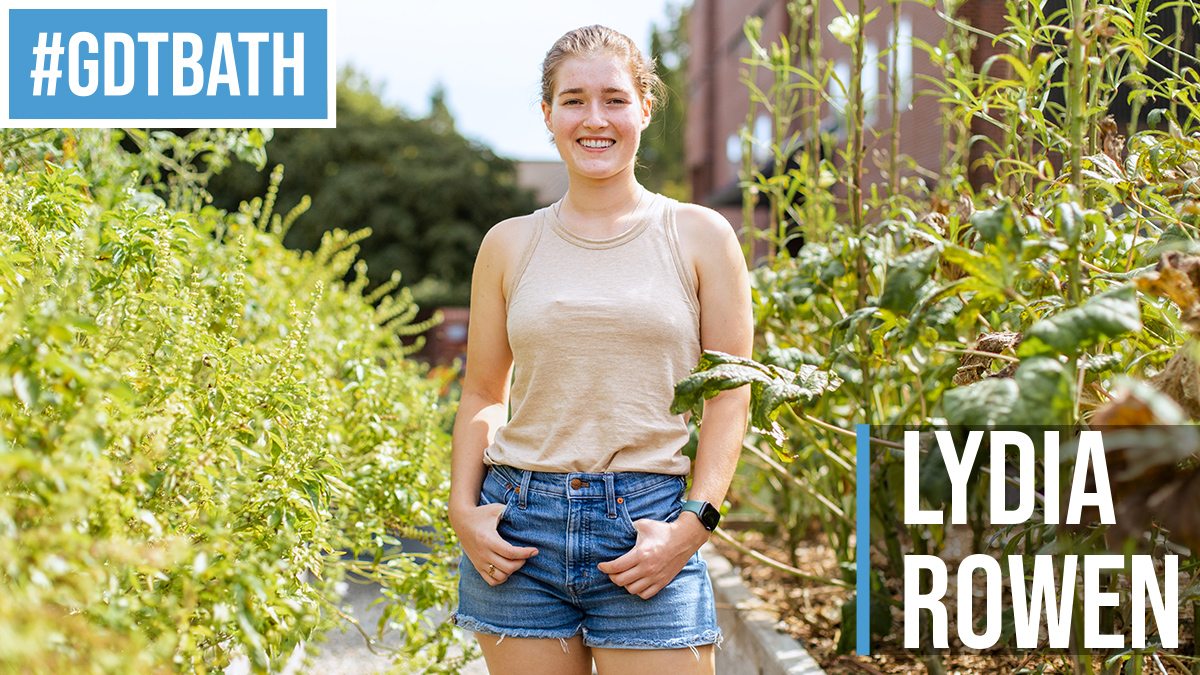#GDTBATH: Lydia Rowen
Co-founded by sophomore Lydia Rowen, CompostMates is a Carolina student organization dedicated to expanding access to composting for off-campus Tar Heels through a free, curbside food scrap collection service.

In the decades since climate scientists first warned about the warming earth, the temperature has continued to rise. Many factors go into the amount of carbon in the atmosphere and cause the temperature to rise, but methane is one of the biggest culprits.
Composting reduces methane production. Instead of adding to landfills, which decompose anaerobically due to a lack of oxygen and release methane, composting allows food scraps to decompose organically. Plus, composting helps feed soil, producing rich growth material for future plants.
Carolina has a robust on-campus composting program in its dining halls, but for students who live off-campus, the options get expensive. “There are a lot of food scrap collection businesses popping up across the nation, but these services are pretty pricey for students,” says Lydia Rowen, a sophomore majoring in environmental science.
Rowen grew up watching her mother compost. “I had an early exposure to it,” she says. “It made sense for people to be doing it as part of a daily routine.”
But when she came to college, she found it more difficult to save the food scraps from entering the landfill. “Last year, I was living in an off-campus house and could no longer rely on my mom’s convenient backyard composter. Luckily, I lived near the Carrboro Farmers’ Market and could drop off my scraps on Saturdays. But for a lot of students, they lack the time, transportation or know-how necessary to do that.”
This led her to co-found CompostMates with a group of fellow Tar Heels, including Caroline Shubel, Olivia Tseng, Ideliya Khismatova and Daniel Sheyko. CompostMates is a Carolina student organization dedicated to expanding access to composting for off-campus Tar Heels through a free, curbside food scrap collection service.
CompostMates originated from the Student Government’s Environmental Affairs Committee, which brainstormed the idea and then applied for one of the Carolina Center for Public Service’s Robert E. Bryan Fellowships. The award comes with a stipend to support groups interested in creating social change by addressing a community-identified need.
“With [the fellowship’s] funding, we were able to make the service free,” says Rowen. Members receive food scrap buckets and every other weekend CompostMates volunteers will collect the scraps and drop them off to their garden partners: Carolina Community Garden, Edible Campus Garden and the Giving Garden.
“It’s very helpful having these community garden partners because they do the work of turning these food scraps into compost, and we’re really just supplying the raw goods,” says Rowen. But those raw goods add up. “In the spring, we were doing biweekly pickups for 60 student houses, and we were able to divert over one ton of food waste from the landfill.”
The service isn’t just about reducing the volume of waste that goes into landfills and their subsequent methane generation, but about encouraging students to live more sustainably. And the demand for CompostMates has been high.
“We don’t have a problem with finding folks who want to receive the service,” says Rowen. “It’s just about making sure we have the necessary volunteer numbers to meet the need.”
The group is currently recruiting more volunteers this semester. Rowen also knows that their pickup model, which relies on student volunteers to drive around Chapel Hill and collect food scraps, isn’t sustainable in the long run. The logistics of their operation is demanding, particularly for full-time students. Rowen says they are working on changing habits, local policy and the landscape of local community gardens for now. This growth will allow for a different model to emerge.
“Ideally, years from now, the community gardens in the area would grow in number and size, so folks who are living off-campus could walk over to their nearest garden, dump their scraps, do some pitchforking on the compost piles, and walk back home,” Rowen says.
Students interested in learning more about CompostMates can email unccompostmates@gmail.com or follow them on Instagram @compostmates_unc




